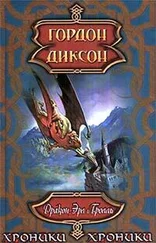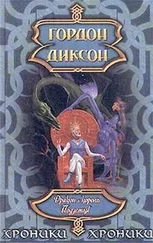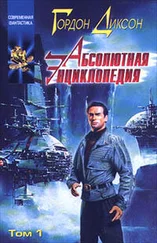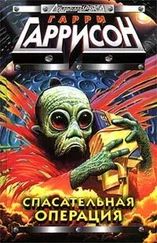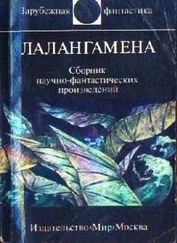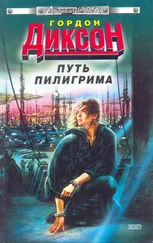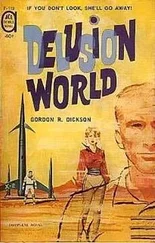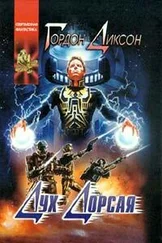They are fools who think otherwise. No great effort was ever bought. No painting, no music, no poem, no cathedral in stone, no church, no state was ever raised into being for payment of any kind. No Parthenon, no Thermopylae was ever built or fought for pay or glory; no Bukhara sacked, or China ground beneath Mongol heel, for loot or power alone. The payment for the doing of these things was itself the doing of them.
To wield oneself—to use oneself as a tool in one’s own hand—and so to make or break that which no one else can build or ruin—that is the greatest pleasure known to man! To one who has felt the chisel in his hand and set free the angel prisoned in the marble block, or to one who has felt the sword in hand and set homeless the soul that a moment before lived in the body of his mortal enemy—to these both come alike the taste of that rare food spread only for demons or for gods.
As it had come to me, these two and more than two years past.
I had dreamed of holding the lightning in my hand over the sixteen worlds and bending them all to my will. Now, I held that lightning, in sober fact, and read it. My abilities had hardened in me; and I knew now what failure of a wheat harvest on Freiland must mean in the long run to those who needed but could not pay for professional education on Cassida. I saw the movements of those like William of Ceta, Project Blaine of Venus, and Sayona the Bond, of both Exotic Worlds—all of whom bent and altered the shape of things happening between the stars—and I read their results-to-be clearly. And with this knowledge I moved to where the news would be, and wrote it even as it was only beginning to happen, until my fellow Guild members began to think me half-devil or half-seer.
But I cared nothing for their thoughts. I cared only for the secret taste of my waiting revenge, the feel of the hidden sword in my grasp—the tool of my Destruct !
For now I had no doubts left. I did not love him for it, but Mathias had seen me clearly—and from his grave, I worked the will of his anti-faith, but with a power he could never have imagined.
Now, however, I was at Piers Leaf’s office. He was standing in the door of it, waiting for me, for from below they would have warned him I was on my way up. He took my hand in a handshake and held it to draw me inside his office and close the door behind us. We sat down not at his desk, but to one side on the floats of a sofa and an overstuffed chair; and he poured drinks for us both with fingers that seemed thinned by sudden age.
“You’ve heard, Tam?” he said without preamble. “Morgan Chu Thompson is dead.”
“I’ve heard,” I said. “And a seat on the Council is now vacant.”
“Yes.” He drank a little from his glass and set it down again. He rubbed a hand wearily over his face. “Morgan was an old friend of mine.”
“I know,” I said, though I felt nothing for him at all. “It must be hard on you.”
“We were the same age—” He broke off, and smiled at me a little wanly. “I imagine you’re expecting me to sponsor you for the empty seat?”
“I think,” I said, “the Guild members might think it a little odd if you didn’t, the way things have been going for me for some time now.”
He nodded but at the same time he hardly seemed to hear me. He picked up his drink and sipped at it again, without interest, and set it down.
“Nearly three years ago,” he said, “you came in here to see me with a prediction. You remember that?”
I smiled.
“You could hardly forget it, I suppose,” he said. “Well, Tam—” He stopped and signed heavily. He seemed to be having trouble getting down to what he wished to say. But I was old and experienced in patience nowadays. I waited. “We’ve had time to see things work out and it seems to me, you were both right—and wrong.”
“Wrong?” I repeated.
“Why, yes,” he said. “It was your theory that the Exotics were out to destroy the Friendly culture on Harmony and Association. But look at how things have gone since then.”
“Oh?” I said. “How?—For example?”
“Why,” he said, “it’s been plain for nearly a generation now that the fanaticism of the Friendlies—acts of unreasoning violence like that massacre that took your brother-in-law’s life on New Earth three years ago—were turning opinion on the fourteen other worlds against the Friendlies. To the point where they were losing the chance to hire out their young men as mercenary soldiers. But anyone with half an eye could see that was something the Friendlies were doing to themselves simply by being the way they are. The Exotics couldn’t be to blame for that.”
“No,” I said. “I suppose not.”
“Of course not.” He sipped at his drink again, a little more heartily this time. “I think that was why I felt so much doubt when you told me that the Exotics were out to get the Friendlies. It just didn’t ring right. But then it turned out to be Friendly troops and equipment backing that Blue Front revolution on St. Marie, right in the Exotics’ back yard under the Procyon suns. And I had to admit there seemed to be something going on between the Friendlies and the Exotics.” He stopped and looked at me.
“Thank you,” I said.
“But the Blue Front didn’t last,” he went on.
“It seemed to have a great deal of popular support at first,” I interrupted.
“Yes, yes.” Piers brushed my interruption aside.
“But you know how it is in situations like that. There’s always a chip on the shoulder where a bigger, richer neighbor’s concerned—next door or on the next world, whichever. The point is, the St. Marians were bound to see through the Blue Front shortly and toss them out—make them an illegal party as they are now. That was bound to happen. There were only a handful of those Blue Front people, anyway, and they were mostly crackpots. Besides, St. Marie isn’t set up to go it alone, financially or any other way, in the shadow of two rich worlds like Mara and Kultis. The Blue Front thing was bound to fail—anyone outside the picture had to see that.”
“I suppose so,” I said.
“You know so!” said Piers. “Don’t tell me anyone with the perception you’ve demonstrated couldn’t see that from the start, Tam. I saw it myself. But what I didn’t see—and apparently you didn’t either—was that, inevitably, once the Blue Front was kicked out, the Friendlies would put in an occupation force on St. Marie to back up their claim for payment from the legal government for the help they’d given the Blue Front. And that under the mutual assistance treaty that had always existed between the Exotics and the legal government of St. Marie, the Exotics would have to reply to the St. Marians’ call for help to oust the Friendly occupation forces—since St. Marie couldn’t pay the kind of bill the Friendlies were presenting.”
“Yes,” I said. “I foresaw that, too.”
He darted a sharp glance at me.
“You did?” he said. “Then how could you think that—” He broke off, suddenly thoughtful.
“The point is,” I said easily, “that the Exotic expeditionary forces haven’t been having too much trouble pushing the Friendly forces back into a corner and cutting them up. They’ve stopped for the winter season now; but unless Eldest Bright and his council send reinforcements, the soldiers they have on St. Marie will probably have to surrender to the Exotic troops this spring. They can’t afford to send reinforcements but they have to anyway—”
“No,” said Piers, “they don’t.” He looked at me strangely. “You’re about to claim, I suppose, that this whole situation was an Exotic maneuver to bleed the Friendlies twice-both for their help to the Blue Front, and again in the cost of sending reinforcements.”
Читать дальше
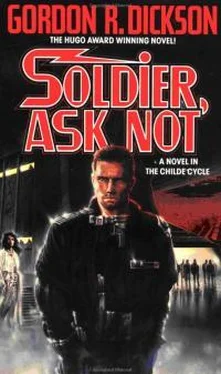
![Гордон Диксон - Некромант [Некромансер; Нет места человеку]](/books/4913/gordon-dikson-nekromant-nekromanser-net-mesta-che-thumb.webp)
